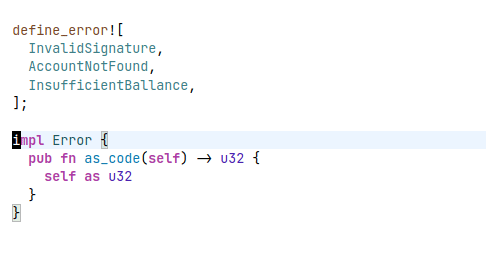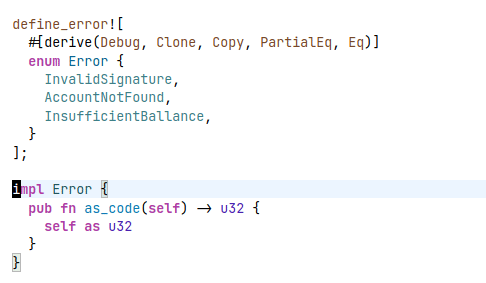Self Modifying Code
This post has nothing to do with JIT-like techniques for patching machine code on the fly (though they are cool!). Instead, it describes a cute/horrible trick/hack you can use to generate source code if you are not a huge fan of macros. The final technique is going to be independent of any particular programming language, but the lead-up is going to be Rust-specific. The pattern can be applied to a wide variety of tasks, but we’ll use a model problem to study different solutions.
Problem
I have a field-less enum representing various error conditions:
pub enum Error {
InvalidSignature,
AccountNotFound,
InsufficientBalance,
}
This is a type I expect to change fairly often. I predict that it will grow a lot. Even the initial version contains half a dozen variants already! For brevity, I am showing only a subset here.
For the purposes of serialization, I would like to convert this error to and from an error code. One direction is easy, there’s built in mechanism for this in Rust:
impl Error {
pub fn as_code(self) -> u32 {
self as u32
}
}
The other direction is more annoying: it isn’t handled by the language automatically yet (although there’s an in-progress PR which adds just that!), so we have to write some code ourselves:
impl Error {
pub fn as_code(self) -> u32 {
self as u32
}
pub fn from_code(code: u32) -> Option<Error> {
let res = match code {
0 => Error::InvalidSignature,
1 => Error::AccountNotFound,
2 => Error::InsufficientBalance,
_ => return None,
};
Some(res)
}
}
Now, given that I expect this type to change frequently, this is
asking for trouble! It’s very easy for the match and
the enum definition to get out of sync!
What should we do? What can we do?
Minimalist Solution
Now, seasoned Rust developers are probably already thinking about macros (or maybe even about specific macro crates). And we’ll get there! But first, let’s see how I usually solve the problem, when (as I am by default) I am not keen on adding macros.
The idea is to trick the compiler into telling us the number of elements in the enum, which would allow us to implement some sanity checking. We can do this by adding a fake element at the end of the enum:
pub enum Error {
InvalidSignature,
AccountNotFound,
InsufficientBalance,
__LAST,
}
impl Error {
const ALL: [Error; Error::__LAST as usize] = [
Error::InvalidSignature,
Error::AccountNotFound,
Error::InsufficientBalance,
];
pub fn from_code(code: u32) -> Option<Error> {
Error::ALL.get(code as usize).copied()
}
pub fn as_code(self) -> u32 {
Error::ALL
.into_iter()
.position(|it| it == self)
.unwrap_or_default() as u32
}
}
Now, if we add a new error variant, but forget to update the ALL array, the code will fail to compile — exactly the
reminder we need. The major drawback here is that __LAST variant has to exist. This is fine for internal
stuff, but something not really great for a public, clean API.
Minimalist Macro
Now, let’s get to macros, and let’s start with the simplest possible one I can think of!
define_error![
InvalidSignature,
AccountNotFound,
InsufficientBalance,
];
impl Error {
pub fn as_code(self) -> u32 {
self as u32
}
}
Pretty simple, heh? Let’s look at the definition of define_error! though:
macro_rules! define_error {
($($err:ident,)*) => {
pub enum Error {
$($err,)*
}
impl Error {
pub fn from_code(code: u32) -> Option<Error> {
$(const $err: u32 = Error::$err as u32;)*
match code {
$($err => Some(Error::$err),)*
_ => None,
}
}
}
};
}
That’s … quite literally a puzzle! Declarative macro machinery is comparatively inexpressive, so you need to get creative to get what you want. Here, ideally I’d write
match code {
0 => Error::InvalidSignature,
1 => Error::AccountNotFound,
2 => Error::InsufficientBalance,
}
Alas, counting in macro by example is possible, but not trivial. It’s a subpuzle! Rather than solving it, I use the following work-around:
const InvalidSignature: u32 = Error::InvalidSignature as u32;
match {
InvalidSignature => Error::InvalidSignature,
}
And then I have to #![allow(non_upper_case_globals)],
to prevent the compiler from complaining.
Idiomatic Macro
The big problem with macro is that it’s not only the internal implementation which is baroque! The call-site is pretty inscrutable as well! Let’s imagine we are new to a codebase, and come across the following snippet:
define_error![
InvalidSignature,
AccountNotFound,
InsufficientBalance,
];
impl Error {
pub fn as_code(self) -> u32 {
self as u32
}
}
The question I would ask here would be “what’s that Error thing is?”. Luckily, we live in the age of powerful
IDEs, so we can just “goto definition” to answer that, right?

Well, not really. An IDE says that the Error token is
produced by something inside that macro invocation. That’s
a correct answer, if not the most useful one! So I have to read the
definition of the define_error macro and understand how
that works internally to get the idea about public API available
externally (e.g., that the Error refers to a public
enum). And here the puzzler nature of declarative macros is
exacerbated. It’s hard enough to figure out how to express the idea
you want using the restricted language of macros. It’s doubly hard
to understand the idea the macro’s author had when you
can’t peek inside their brain and observer only to the
implementation of the macro.
One remedy here is to make macro input look more like the code we want to produce. Something like this:
define_error![
pub enum Error {
InvalidSignature,
AccountNotFound,
InsufficientBalance,
}
];
impl Error {
pub fn as_code(self) -> u32 {
self as u32
}
}
This indeed is marginally friendlier for IDEs and people to make sense of:

The cost for this is a more complicated macro implementation. Generally, a macro needs to do two things: parse arbitrary token stream input, and emit valid Rust code as output. Parsing is usually the more complicated task. That’s why in our minimal attempt we used maximally simple syntax, just a list of identifiers. However, if we want to make the input of the macro look more like Rust, we have to parse a subset of Rust, and that’s more involved:
macro_rules! define_error {
(
$()*
$vis:vis enum $Error:ident {
$($err:ident,)*
}
) => {
$()*
$vis enum $Error {
$($err,)*
}
impl Error {
pub fn from_code(code: u32) -> Option<Error> {
$(const $err: u32 = $Error::$err as u32;)*
match code {
$($err => Some($Error::$err),)*
_ => None,
}
}
}
};
}
define_error![
pub enum Error {
InvalidSignature,
AccountNotFound,
InsufficientBalance,
}
];
We have to carefully deal with all those visibilities and attributes. Even after we do that, the connection between the input Rust-like syntax and the output Rust is skin-deep. This is mostly smoke and mirrors, and is not much different from, e.g., using Haskell syntax here:
macro_rules! define_error {
(
data $Error:ident = $err0:ident $(| $err:ident)*
$(deriving ($($derive:ident),*))?
) => {
$()?
enum $Error {
$err0,
$($err,)*
}
impl Error {
pub fn from_code(code: u32) -> Option<Error> {
const $err0: u32 = $Error::$err0 as u32;
$(const $err: u32 = $Error::$err as u32;)*
match code {
$err0 => Some($Error::$err0),
$($err => Some($Error::$err),)*
_ => None,
}
}
}
};
}
define_error![
data Error = InvalidSignature | AccountNotFound | InsufficientBalance
deriving (Debug, Clone, Copy, PartialEq, Eq)
];
impl Error {
pub fn as_code(self) -> u32 {
self as u32
}
}
Attribute Macro
We can meaningfully increase the fidelity between macro input and macro output by switching to a derive macro. In contrast to function-like macros, derives require that their input is syntactically and even semantically valid Rust.
So the result looks like this:
use macros::FromCode;
enum Error {
InvalidSignature,
AccountNotFound,
InsufficientBalance,
}
impl Error {
pub fn as_code(self) -> u32 {
self as u32
}
}
Again, the enum Error here is an honest, simple enum!
It’s not an alien beast which just wears enum’s skin.
And the implementation of the macro doesn’t look too bad either, thanks to @dtolnay’s tasteful API design:
use proc_macro::TokenStream;
use quote::quote;
use syn::{parse_macro_input, DeriveInput};
pub fn from_code(input: TokenStream) -> TokenStream {
let input = parse_macro_input!(input as DeriveInput);
let error_name = input.ident;
let enum_ = match input.data {
syn::Data::Enum(it) => it,
_ => panic!("expected an enum"),
};
let arms =
enum_.variants.iter().enumerate().map(|(i, var)| {
let i = i as u32;
let var_name = &var.ident;
quote! {
#i => Some(#error_name::#var_name),
}
});
quote! {
impl #error_name {
pub fn from_code(code: u32) -> Option<#error_name> {
match code {
#(#arms)*
_ => None,
}
}
}
}
.into()
}
Unlike declarative macros, here we just directly express the syntax that we want to emit — a match over consecutive natural numbers.
The biggest drawback here is that on the call-site now we don’t have
any idea about the extra API generated by the macro. If,
with declarative macros, you can notice an pub fn
from_code in the same file and guess that that’s a part of
an API, with a procedural macro that string is in a completely
different crate! While proc-macro can greatly improve the ergonomics
of using and implementing macros (inflated compile times
notwithstanding), for the reader, they are arguably even more opaque
than declarative macros.
Self Modifying Code
Finally, let’s see the promised hacky solution :) While, as you might have noticed, I am not a huge fan of macros, I like plain old code generation — text in, text out. Text manipulation is much worse-is-betterer than advanced macro systems.
So what we are going to do is:
-
Read the file with the enum definition as a string (
file!()macro will be useful here). -
“Parse” enum definition using unsophisticated string splitting
(
str::split_once, akacutwould be our parser). - Generate the code we want by concatenating strings.
- Paste the resulting code into a specially marked position.
- Overwrite the file in place, if there are changes.
-
And we are going to use a
#[test]to drive the process!
pub enum Error {
InsufficientBalance,
InvalidSignature,
AccountNotFound,
}
impl Error {
fn as_code(self) -> u32 {
self as u32
}
fn from_code(code: u32) -> Option<Error> {
let res = match code {
// region:sourcegen
0 => Error::InsufficientBalance,
1 => Error::InvalidSignature,
2 => Error::AccountNotFound,
// endregion:sourcegen
_ => return None,
};
Some(res)
}
}
fn sourcegen_from_code() {
let original_text = std::fs::read_to_string(file!()).unwrap();
let (_, variants, _) =
split_twice(&original_text, "pub enum Error {\n", "}")
.unwrap();
let arms = variants
.lines()
.map(|line| line.trim().trim_end_matches(','))
.enumerate()
.map(|(i, var)| format!(" {i} => Error::{var},\n"))
.collect::<String>();
let new_text = {
let start_marker = " // region:sourcegen\n";
let end_marker = " // endregion:sourcegen\n";
let (prefix, _, suffix) =
split_twice(&original_text, start_marker, end_marker)
.unwrap();
format!("{prefix}{start_marker}{arms}{end_marker}{suffix}")
};
if new_text != original_text {
std::fs::write(file!(), new_text).unwrap();
panic!("source was not up-to-date")
}
}
fn split_twice<'a>(
text: &'a str,
start_marker: &str,
end_marker: &str,
) -> Option<(&'a str, &'a str, &'a str)> {
let (prefix, rest) = text.split_once(start_marker)?;
let (mid, suffix) = rest.split_once(end_marker)?;
Some((prefix, mid, suffix))
}
That’s the whole pattern! Note how, unlike every other solution, it
is crystal clear how the generated code works. It’s just code which
you can goto-definition, or step through in debugging. You can be
completely oblivious about the shady #[test] machinery,
and that won’t harm understanding in any way.
The code of the “macro” is also easy to understand — that’s literally string manipulation. What’s more, you can easily see how it works by just running the test!
The “read and update your own source code” part is a bit mind-bending! But the implementation is tiny and only uses the standard library, so it should be easy to understand.
Unlike macros, this doesn’t try to enforce at compile time that the
generated code is fresh. If you update the Error
definition, you need to re-run test for the generated code to be
updated as well. But this will be caught by the tests. Note
the important detail — the test only tries to update the source code
if there are, in fact, changes. That is, writable src/
is required only during development.
That’s all, hope this survey was useful! Discussion on /r/rust.